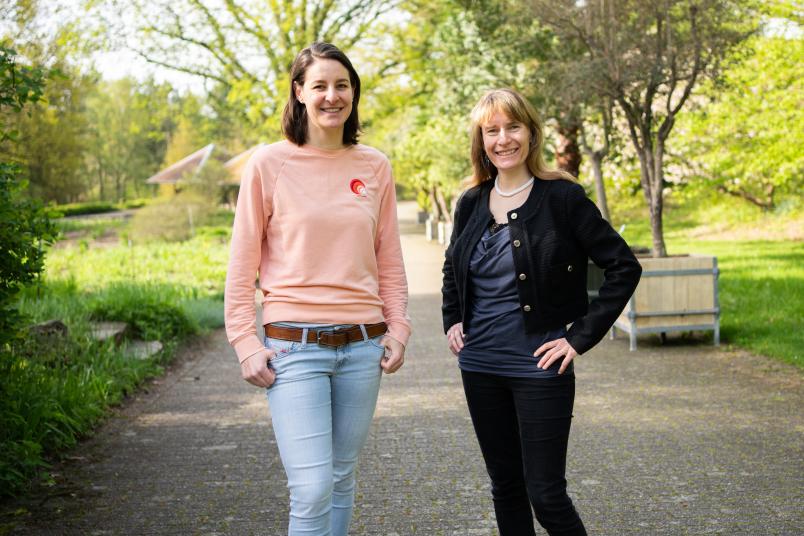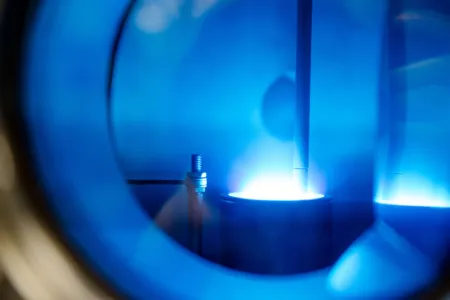
Interview
Young scientists benefit from international exchange
Two plasma physicists explain the versatile advantages of a french-german collaboration and how their students grow on that experience.
To control plasma-produced carbon monoxide and use its anti-inflammatory effects on wound healing is the aim of a cooperation between Professor Judith Golda from Ruhr University Bochum, Germany, and Professor Claire Douat from Université d’Orléans, France. In six mutual visits their groups experimented together, financed by the German Academic Exchange Service and by Campus France.
Ms. Golda, what would you like to achieve?
Judith Golda: Today plasma is not yet a well-understood, efficient and easy tool in medicine, I would say. We hope that in the future doctors can simply use a plasma-source to cure diseases of the skin.
For which medical applications is plasma already used?
Golda: A few hospitals in Germany are utilizing it for wound healing within clinical studies. Moreover, there are surveys for cancer therapy, sterilisation…
Claire Douat: … the treatment of teeth, skin diseases like psoriasis and acne, for cosmetics and blood coagulation, to avoid or reduce a bleeding.
How exactly does plasma work in wound healing?
Golda: There are different effects. One of them is sterilisation, another blood coagulation. Plasma can also increase the blood flow in the wound. And it can work anti-inflammatory by producing reactive species that resemble natural messenger substances.
In what way do your teams complement each other?
Golda: In France, the plasma source is a little bit different from ours. It produces more charged species in the vicinity of the treated substrate and a different mixture of chemical species, for example. On the one hand, we compare the plasma sources, on the other hand we exchange complementary diagnostics: In Orléans they use optical sensors for measuring the gas density – such as the one for carbon monoxide, in Bochum we employ mass spectrometry.
Why is it difficult to prove the impact of a single plasma component?
Douat: In a plasma there are many chemical reactions happening simultaneously. We have the electric field, reactive oxygen species and the light. So, it is not only difficult to explore but also to control it. At some concentrations those reactive species are beneficial, but at higher ones they can become toxic. In sterilisation or cancer treatment we want this toxicity, but in wound healing we don’t.

Now we have a lot of science to discuss.
Claire Douat
What is characteristic of the cold atmospheric pressure plasma you use for the treatment of biological substrates?
Golda: Unlike other plasmas it stays cold enough not to harm the skin. The idea is to channel the energy we put in the plasma into the electrons to heat them. In this condition they are able to dissociate molecules and create reactive species while the gas remains close to room temperature. That is this non equilibrium character that everybody is talking of.
Which substrates do you use for your experiments?
Douat: Right now, we are utilizing bacteria. The next step will be on cells and afterwards on animals. But before, we need to make sure that the treatment is safe, for example that the electric current through the biological target is not too high.
What could you find out until now?
Douat: We performed electrical measurement and determined the concentration of some species in the different plasma-sources. For that we have one from Bochum in Orléans and they have one from us in Bochum. In the end, we treated bacteria to see the effects of the two plasma-sources: the bacteria didn’t behave in the same way when treated with diverse plasmas. Which is nice, because now we have a lot of science to discuss and are writing a paper about it.

Internationally, Ruhr University is a very well-known place for plasma research, with leading plasma and modelling experimental physicists.
Claire Douat
Ms. Douat, what is your impression of Ruhr University?
Douat: I really like being in Bochum. Every time I come here, it’s easy. There is all this infrastructure with the hotel and everything I need in walking distance to university – including supermarkets and even a swimming pool.
From my point of view, when we are every day in the same place, we see things not the way we see them as a visitor. In Bochum they are well organised and there is always room for ease. Also internationally, Ruhr University is a very well-known place for plasma research, with leading plasma and modelling experimental physicists.
It’s fine to be here and to discuss with them. In addition, they have a big pack of experimental setup. I would not say everything, but a lot. When we want to test something, there is always a way to make it possible.
Golda: Also, the mensa has vegan and vegetarian options. One of the French students is vegetarian …
Douat: … and the view is great!

Sometimes it’s really inspiring to be in a new environment like another lab or university to get new ideas.
Judith Golda
What are the advantages of your cooperation?
Golda: It’s a lot of fun. I like co-operating with Claire and her group. When you are working on a topic on your own, from time to time you get stuck on your ideas. In a cooperation we can discuss the issues and develop new ideas together. Sometimes it’s really inspiring to be in a new environment like another lab or university to get new ideas. In addition, Claire and her team have some expertise we don’t have.
Douat: It’s always fine to discuss and see another point of view. The students also work together and learn from each other. That’s a very good experience for them.
Golda: You really see how they grow. The first time the students go to France they are rather shy and seem kind of lost. The second time it’s like they feel at home there. The relationships between them change a lot and it’s awesome to watch them meeting at the weekend and spending free time together.
Douat: When we come to Bochum or our colleagues visit us in Orléans, it’s a bit like holidays, at least for Judith and me. Not in the sense that we wouldn’t work. We work a lot when we travel. But in that time, we have only one task to do, so we can focus on it. At home, we are busy with so many different things every day. Right now, we enjoy just to be at the laboratory, the whole day working on one project.
Persons
